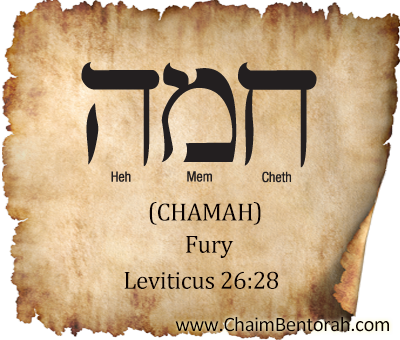Hebrew Word Study – Fury – Chama
 Leviticus 26:28: “Then I will walk contrary unto you also in fury; and I, even I, will chastise you seven times for your sins.” KJV
Leviticus 26:28: “Then I will walk contrary unto you also in fury; and I, even I, will chastise you seven times for your sins.” KJV
Leviticus 26:28: “I will act with furious rage against you, and I Myself will punish you sevenfold for your sins.” Berean Study Bible
I am extremely fortunate to live in Chicago, where I can hop on the Stevenson Expressway and be at the University of Chicago library in fifteen minutes. The University of Chicago houses one of the best libraries on Semitic culture and languages in this country. This library allows me access to books, lexicons, and research papers that are out of print or would cost a fortune to own, even if they were still in print, many of which are not. I saw a 300-page dissertation just on the word Chased – lovingkindness. You ask how anyone could write so much about one word. As the old saying goes, “If you love it enough, it will reveal its secrets. So when I do a short study on a word, you can be sure I have not exhausted all there is to say about that word.
With that in mind, I am revisiting the word contrary as it is rendered in the KJV or furious rage as it is rendered in the Berean Study Bible. It is translations like that given by the Berean Study Bible that give the Old Testament such a bad reputation. I specifically went to the University of Chicago to research this word chamah which is rendered as fury. I discovered from the Assyrian Dictionary of the Oriental Institute of the University of Chicago 140a.2 that the origin of this word in the Sumerian and Akkadian is imtu which is poisonous foam or venom that flows from the mouth of a snake. There is an ancient Sumerian story of seven vessels, the seventh being filled with viper’s venom. The word contrary qari has the idea of a misfortunate encounter or meeting. Chamah qari would have the idea of a meeting which leaves God foaming at the mouth, as if He had taken poison. Thus if we disobey God, then walking with God in an association would be like poison in His mouth. We can sin and God will endure and forgive but that seven times, not literally seven but metaphorically the seventh, the straw breaking the camel’s back is the one that finally causes God to foam as if He has been poisoned.
Would you like Chaim Bentorah as your personal Hebrew teacher?
|
|
This would make more sense than the literal rendering of af ani. Normally translators render af ani as “even I” to emphasize that God is saying that He and He alone. In other words: “Even I will chastise or punish you seven times for your sins.” The word chastise yachar means to either punish or instruct. Yet in this context as a reference to sin, we can only say punish as God will not really instruct us in our sins. The context clearly has the idea of chastisement. Yet the Medieval Rabbi Israel Ben Eliezer translates this literally as “I too” or “I also.” Rabbi Eliezer explains that the syntax really implies: “I too will be punished for your sins.” This poisonous foam coming from God’s mouth is not anger or rage over our sins; it is sin that is metaphorically poisoning God.
When we sin there is a natural consequence to our sins and we end up suffering for our sins. We are punished for our sins naturally and like a good parent, God will allow us to suffer the consequences of our sin, and like a loving parent, He will also suffer, many times even more than the wayward child. That is why, when we sin, it is like we have poisoned God.
If we truly love God we will not sin, not only because we do not want to suffer the consequences of our sins but also because we know it is like feeding poison or causing suffering to the God we love.
Hi there! Thank you for reading this Daily Word Study. Can I ask a favor? Share this Daily Word Study with your friends on Facebook and Twitter by clicking one of the icons below.
Thanks & Blessings, it means a lot to me!







This hit hard. Thank you. Your comment in para 1 – “if you love it enough, it will reveal its secrets” I am sure this be applied to our feelings to the Almighty.
The poison issue is perhaps one we could use to help us gain a better understanding of hurting God, and ourselves. Thank you.